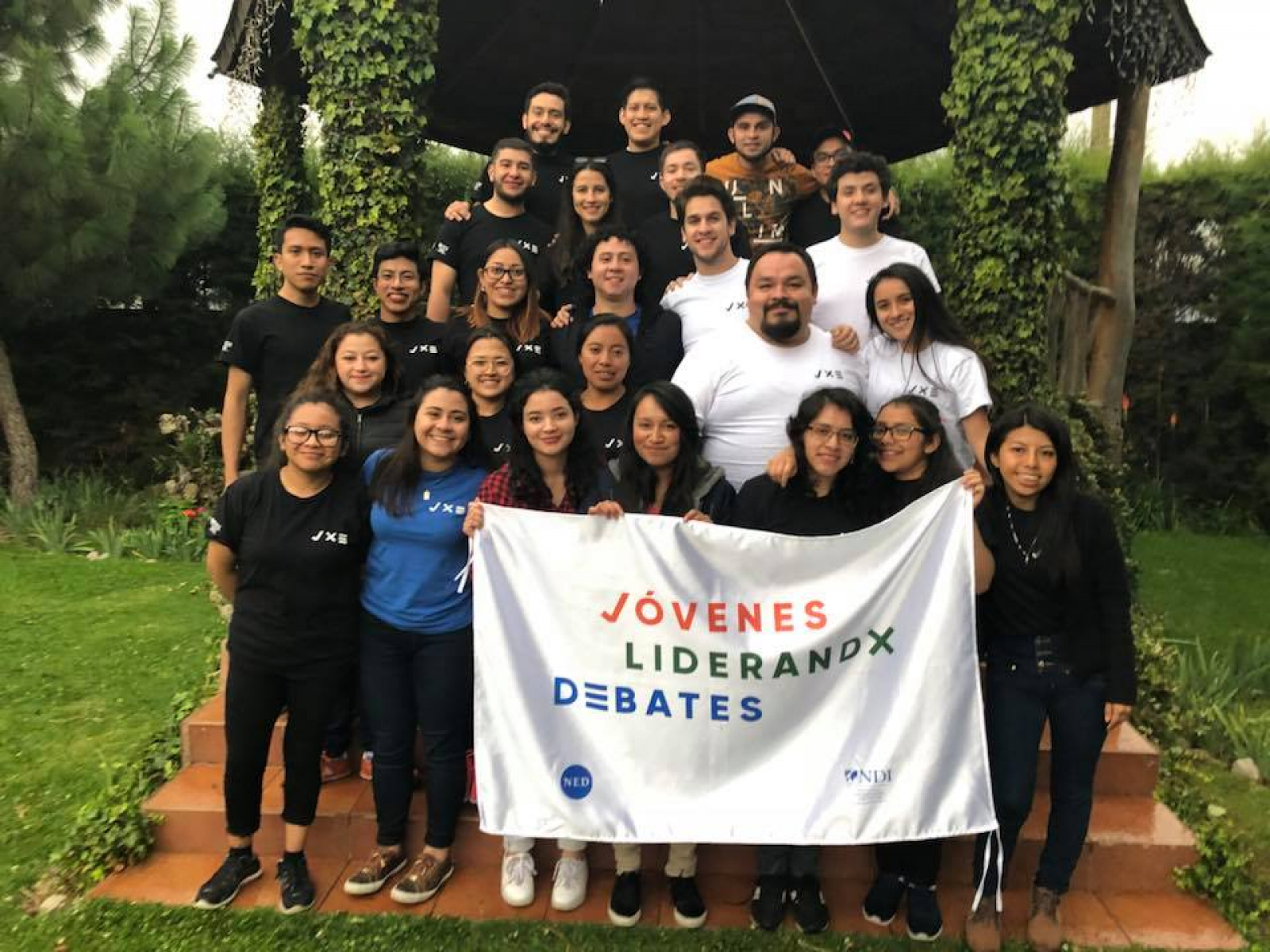
Youth participants and facilitators at a debate skills bootcamp held in Quetzaltenango
SHARE
On November 30, 2018, 44 young people gathered from different regions across Guatemala to compete in a national debate tournament in Guatemala City. Teams of two participated alongside their peers in a full day of competition, where they had the unique opportunity to publicly debate policy reform proposals and model civil political discourse. Topics included immigration, higher education, congressional allowances and criminal justice reform. During the debates, young people dissected these issues, argued for and against reform options and demonstrated the contributions they can make to solving public policy challenges.
NDI developed the “Youth Leading Debate” (Jóvenes Liderando Debates) program to help politically active young people, age 18 to 24, learn the art of competitive policy debate. During the program, young people from urban and rural areas gathered in Coban, Quetzaltenango and Guatemala City to participate in policy dialogues and debate instruction camps. These activities prepared them for a set of regional and national competitions where they confidently displayed their analytical skills and their ability to speak publicly in front of senior political leaders and other citizens.
In Guatemala, young people’s political activism has steadily increased in recent years, as evidenced by the establishment of new youth-led organizations, political parties and movements to address some of the country’s most pressing problems. Despite these improvements, young Guatemalans still have limited opportunity to learn democratic practices or demonstrate the value of their participation in political life. The limits of their agency was evident during a working session NDI held with a diverse group of Latin American political activists in November 2016. During the event, Guatemalan youth expressed the need to better understand policymaking as a first step toward active engagement in public policy deliberations. Policy debate serves as a uniquely democratic way to develop young people’s political agency.
The debate program began with over 100 young people participating in three policy dialogues in Coban, Quetzaltenango and Guatemala City. These events provided participants with an opportunity to identify issues that matter to them, learn from policy experts and discuss pressing policy issues facing their communities and their country. Elected officials joined the participants to provide their expertise and political insights. For many participants, this was their first opportunity to have a discussion with an elected official who represented their community – an important achievement in and of itself.
Following the policy dialogues, participants were invited to apply for a three-day debate “bootcamp”, designed to provide a comprehensive introduction to policy debate. During the camp, which was facilitated by a debate expert and youth facilitators, participants developed skills such as critical thinking, active listening and communication. Participants also developed practical political skills, such as the ability to research, develop and present comprehensive policy recommendations. Taking part in the camps helped the participants better understand perspectives on both sides of complex public policy issues, minimized polarization over controversial political topics and helped participants build respect and understanding for each other, despite geographical, ethnic and economic differences. These positive interactions increased collaboration and paved the way for the productive exchange of ideas.
...even with deep apathy and inequality there are young people willing to change that reality, and in a way where we are all included and our opinions are heard. This weekend (debate instruction camp) was about sharing with young people like me, who are about what Guatemala can be through debate and friendship.
- Héctor González, Quetzaltenango
After the bootcamps, teams utilized the skills they learned to prepare for regional and national debate tournaments. During the preparation period, teams were given a list of topics to research. The topics stemmed from the policy dialogues and represented a wide range of local and national concerns. In addition to strengthening their debate skills, the tournaments provided the participants with an opportunity to continue developing their networks. These young people were able to connect with political actors and peers from different regions of the country who were also passionate about taking political action. For these young leaders, who are active members of civic organizations, political parties and student organizations, participation in debates goes beyond competition. Public debate provides an important entry point for political participation and a vital platform for demonstrating the value of young people’s contribution to policy reform efforts among decision-makers.
In a sense, we can say that debate is a path that will lead us to a more tolerant society...being a tolerant society that accepts differences, we will surely become a creative, logical, critical and constructive society that recognizes it is our differences that become a motor to generate ideas.
- Otto Barrientos, Quetzaltenango
For additional resources on implementing a youth debate program, download the Youth Leading Debate Program Manual and Instruction Manual.
For global resources on candidate debates, visit NDI’s website Debates International.
Guatemala "Youth Debate" program is implemented with support from the United States Agency for International Development (USAID) through the Consortium for Elections and Political Process Strengthening (CEPPS).


